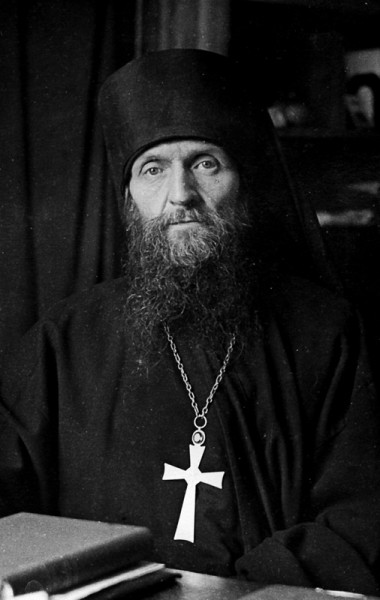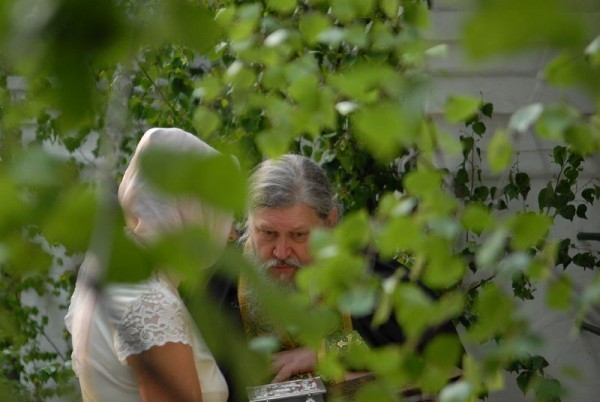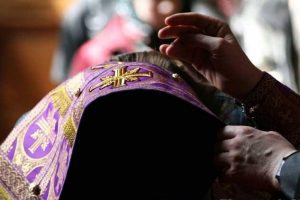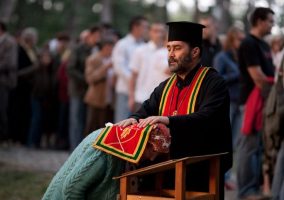A priest very soon will see, serving as a spiritual father in confessions, how little his spiritual children are educated in the understanding of repentance and spiritual making. In the course of time this becomes even more noticeable and with the increasing rate of withdrawal from the Church this gets the threatening size. The simple people still preserve great sincerity and simplicity in confession of their sins from the old times. However, the intelligentsia has long ago stepped aside from the legends of the pious old times. A priest can frequently hear at the confession that a person does not know how to confess, he does not know what is necessary to say. A priest will soon note this problem among his flock. If we add to this the completely anti-Church mood of the society and people around, moreover if there is no possibility to organize preparations for confession under the given conditions, then a priest will see, that his feat of being a spiritual father became exceptionally difficult these days.
What means did the priests have in the old, more favorable times and how could they possibly help to the flock in the matter of the preparation for confession?
In the old times everything helped a priest. The entire way of life of the state, society, big cities, schools, family to a greater or lesser extent contributed to the maintenance of the Church and to strengthening of the traditional foundations. The Church was not separated from the state, used its support, and there was not only any anti-religious propaganda, but vice versa, the state helped, with what it could, to strengthen the church way of life.
Many schools and secondary schools were closed in the first week of the Great Lent and the compulsory fasting of students was held in the churches. There were mass festivals in the Cheesefare week, but with the first peal of the Lenten bell merriment ceased everywhere. In the evenings they tried to go and listen to the canon of St. Andrew of Crete, this most perfect work of the spiritual poetry, finest psychoanalysis and knowledge of the human soul. The images of this canon wake the confessionary mood. In the houses only the lenten food was given. The entire way of life was changed. Theaters were closed; only spiritual concerts were permitted, except the first, fourth and the Passion weeks. All got prepared for confession and taking Communion: from the tsarist court to the last hovel —everybody honored those holy days. The old and young (some — with the skeptical attitude towards this need) went to the church; there came schoolboys, servicemen, officials, merchants and craftsmen.
It is natural that all this made it easier for the penitent to be concentrated on the great sacrament of confession, and for the priests — on the forthcoming exploit of their spiritual service. Almost nothing interfered with the fasting time life. Sometimes they object, that much was compulsory and formal. This has the certain base, but a kind of coercion is the form of the discipline and order and has its psychological side, which cannot be denied in the matter of the religious upbringing.
The fostering care of the church about fasting and confession seemed difficult and unnecessary for some in the youth. But those, who from the childhood were brought up in the atmosphere of piety, tradition and fear of God; who knew the entire beauty of the Lenten custom, the strictness of fasting and happiness of coming out of the fast, who learned to subordinate their desires to the requirements of the church regulations since they were children, know, how much it gives in the matter of self-education and work on oneself. The ones, who did not have any of these early recollections, whose life flew in disorderliness, those are deprived of the richest symphony of the church and spiritual experiences. It would be almost impossible for them to come to Church and plunge into the life of the temple. These people do not usually know how to confess, what to tell to a priest, what the requirements of our traditional asceticism to sinners are and how it can help in the matter of the spiritual revival. Unfortunately, everything said is pitilessly swept by the destructive “progress” and turns of the history. The former way of life cannot be restored.
A pastor is not called and cannot reconstruct the social and state order. But he can influence the family, first the small, and then also the greater, and thus bring up the small church cells, in which children will be suggested the need of the Christian discipline, and perhaps even in the atheist way of life there can be recreated a certain counterweight and the church tradition can be brought up.
A pastor can suggest with his sermons the abstention from the amusements during the fast or, at least, in its certain period. He can appeal to the flock to keep the fast, in what his home must be an example; he must develop the Eucharistic feelings and life.
In the preparatory weeks before the fast a pastor must say the sermons, which explain the need of fasting and salvation character of confession. When the fast begins it is good to preach about the causes of the sin, understanding of the holy fathers of the sin and passions, development of the sin in us. Furthermore, it is necessary to teach about the different types of sin, which are frequently encountered in the community, but that are poorly realized; to reveal the concealed reasons for one or another vice or sinful habit. Some pastors by the brief word of edification before confession help the penitents to understand, what happens at the moment in their souls and mention to those who had come at least the main sins. They should be reminded that in front of the confessionary table it is better not to tell about their everyday plans, to complain of the relatives or to start religious debates, but to say to the people that confession is the moment of admittance of their sins, their enumeration with the repentant mood and desire to fight with them and not to repeat more.
For this purpose the church practice worked out the number of auxiliary measures. It is necessary to recognize that many get so confused at the confession, that cannot say a word, murmur something, justify themselves by the fact that they made nothing terrible, they do not feel their sin…, and this only proves their inability to confess. This is the great responsibility of a confessor to teach people how to confess.
In the childhood many got used to confess their sins with the help of a previously made note. There is nothing bad in this, since it gives the possibility to pre-think their misdeeds and not to forget or conceal anything. People stop doing that with time, but this is a very good method of preparation for confession.
In the old prayer-books there was special daily confession of sins before oneself at the end of the evening rule, where the main types of the sinful states and deeds were mentioned: by “deed, word, thought, overeating, judging, hatred and so forth.” The similar enumerations of sins are very useful for a priest to remember, when he finds it necessary to ask that being confessed these or those questions.
In the old-Russian way of life there were the printed publications, sold in the monasteries and book shops, where the sins were enumerated; they had the name of “general confessions” or “renewals.” The most known is said to be written by St. Dimitrius of Rostov. In many monasteries of old Russia, where frequently they had a small quantity of confessors and large fraternities, such “renewals” were very common and with their help the monks and often arriving pilgrims loved to confess their sins. These “renewals” are widespread at the Holy Athos Mountain up to the present day.
Here is the frequently used text of the confession of sins before a priest from the face of the repentant.
“I confess to the Lord my God and in front of you, reverent father, all my countless transgressions, which I committed up to the present day and hour. Daily and hourly I sin with ingratitude to God for His great and countless good deeds and care about me, a sinner.
I have sinned by indifference to God, by non-following of God’s commandments, feasts, fasts, praying rules and other church established canons, by contempt and deviation from the help to the holy Temple and those in need. I have sinned by the false shame to show myself a Christian, by absent-mindedness during the prayer, the negligent making of the cross sign, by missing divine services and by carelessness. I have sinned by the insincerity at confession, by inconsideration to divine services, sermons, to the reading of spiritual books and negligence to salvation. I have sinned by doubts about the faith, by the superstitious prejudices, visiting fortune tellers, extrasensories, sorcerers, by guess-work and by the game of chances. I have sinned by bitterness, contradiction, complaints, willfulness, reproaches, evil words, lie and laughter. I have sinned by the idle talk, judgment, flattery, disobedience, by the insult of the neighbor, swearing, disrespect to the parents, negligence about the needs of the family, not bringing up the children in the law of God. I have sinned by dreaming, reveling in sinful thoughts, passionate glances, masturbation, by tempting behavior, the breach of chastity, and violation of the conjugal faithfulness, indecent behavior and lechery. I have sinned by gloomy thoughts, despondency, idleness, desperation, thoughts about suicide and complaints. I have sinned by slyness, self-interest, fraud, ill temper, offences, rashness, perfidy, irreconcilability, by the retention of debts, stealing and stinginess. I have sinned by pride, vanity, self-praising, hostility, ambition, grudges, hatred, discords, intrigues, swearing and simulation. I have sinned by sarcasm, vengeance, by the use of stimulants, by smoking and drunkenness. I have sinned by buying of unnecessary things, greediness, mercilessness, envy, anger, slander, impudence, carelessness and irritability. I have sinned by gluttony, generally by excesses in drinks and food, laziness, by the useless expenditure of time before the television set, watching vulgar films and listening to the violent and exciting music. I have sinnedby deed, word, thought, sight, hearing, sense of smell, taste, touch — by all my spiritual and bodily feelings.
I repent all my sins and appeal for forgiveness. (Have not you made any other sin, which burdens the conscience and is shameful to be mentioned?). Moreover, I repent and ask for forgiveness of the sins that I did not confess because of my forgetfulness.
Pardon and absolve me, reverent father, and bless to partake the Holy and Life-giving Christ Gifts, for the remission of sins and for eternal life. Amen.”
The good means for help to the penitent is reading of the spiritual literature, like: “The Philocalia,” “The Ladder,” Abba Doropheus, “The Paterics” and other monuments of the ascetic writings. However, much of this must be recommended with precaution, since it is “to much hard food” for the novices, the people, who never lived the church life. Therefore a pastor must be very reasonable not to repel yet weak people with too severe requirements, given in the mentioned books. In the cloister custom “The Ladder” and “The Philocalia” are not given to any young monk, since they contain thoughts and requirements too strict for the unstable man. Such increased level can cause a feeling of hopelessness, immoderate severity, mercilessness, etc. in a young person, and it easily leads to loosing interest to this type of literature.
Therefore it is very good to begin from the works of bishop Theophan the Recluse, St. Tikhon of Zadon, from the letters of Ambrose of Optina Hermitage. It is possible to advise to read St. Ignatius Bryanchaninov or Archbishop Plato of Costroma, or “The questions for the Repentant” of the exarches of Georgia Iona. These books are to a considerable degree useful for a confessor himself, since they teach him, on what he should be focused specially, while preparing for the accomplishment of the sacrament of confession. The only external deficiency of all these books can be the old-fashioned language and manner of writing. But this can be overcome, since the internal value of these works greatly exceeds this secondary drawback.
Speaking about the similar kind of books we finally focus attention on the remarkable “Confession” of Metr. Anthony Krapovitsky, which presents this question to a degree, equally interesting for both the confessor and the repentant. It introduces the number of questions on the asceticism and explains by simple, literary and very lively language that, what any orthodox person should know about the preparation for confession (Published in Warsaw in 1928).
From The The Orthodox Pastoral Service



















